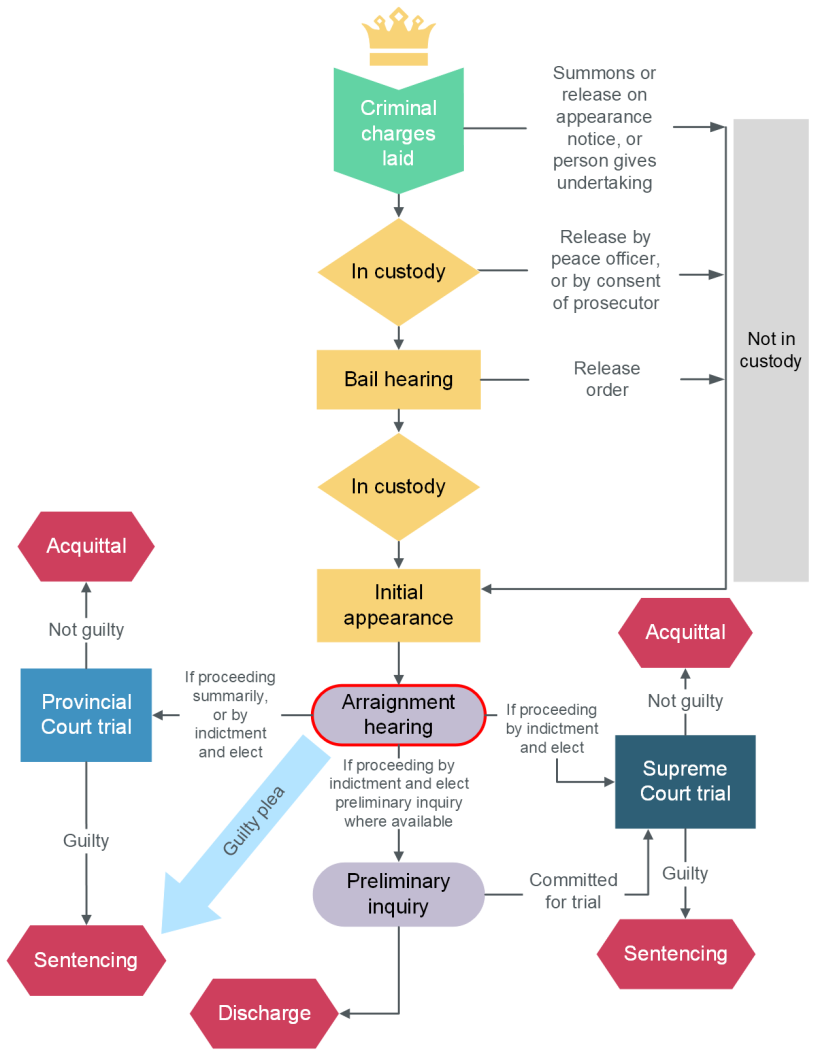Arraignment hearing
An arraignment is usually the hearing where you plead guilty or not guilty to the criminal charge. You are asked to confirm your name and the charges will be read out before you are asked how you plead.

You can be arraigned at your initial appearance<p>Sometimes called a first appearance. When an accused person attends court and a judicial case manager, justice of the peace, or judge tells them what offence or offences they are charged with.</p> or any subsequent court appearance, or at the start of your trial. This means that arraignment<p><span lang="EN-US">A hearing where the criminal charge against the defendant is formally read to them. The accused person states whether they will plead guilty or not guilty and in some cases, whether they request a preliminary hearing. What happens at an arraignment hearing depends on the type of criminal offence the defendant is charged with. </span><span> </span></p> does not always happen at a separate hearing. For a jury trial, you must be arraigned in front of the jurors.
If you plead guilty
If you elect to plead guilty, you will be asked:
If you are making the plea<p><span lang="EN-US">The statement an accused person makes in court when asked if they are guilty or not guilty of committing a crime.</span><span> </span></p> voluntarily
if you understand you are admitting to the essential elements of the offence
If you understand the nature and consequences of your plea
If you understand that the judge is not bound by any agreement you have with Crown counsel<p>Independent lawyers with the federal or provincial prosecution service. Crown counsel do not represent the government, police or victim of crime. Rather, they perform their function on behalf of the public. Crown counsel may also be referred to as Crown, Crown prosecutors or prosecutors.</p>
If you plead guilty the case will go to a sentencing hearing<p><span lang="EN-US">A court hearing where a judge hears submissions from prosecution and defence lawyers about how the offender should be sentenced.</span><span> </span></p> instead of a trial.
If you plead not guilty
If you plead not guilty<p><span lang="EN-US">An accused person makes a “not guilty” plea at an arraignment hearing when they do not admit committing the offence. In a trial, when the prosecutor cannot prove beyond a reasonable doubt that a person committed an offence, the judge or judicial justice must find them “not guilty”.</span><span> </span></p>, a trial date will be set. If the offence you are charged with is a hybrid offence, the Crown will declare at the arraignment hearing whether they are proceeding summarily or by indictment.
Electing how you will be tried
Depending on what you are charged with and whether the Crown is proceeding summarily or by indictment, you may be asked how you “elect” or choose to be tried.
CRIM 02 Elections Under Section 536 Criminal Code of Canada
Summary proceedings
If you are charged with a summary offence or the Crown proceeds summarily, your trial will take place in Provincial Court. You do not have a choice.
Proceedings by indictment
If you are charged with an indictable offence or the Crown proceeds by indictment, you will have 3 options:
Trial in the Provincial Court in front of a judge
Trial in the BC Supreme Court in front of a judge
Trial in the BC Supreme Court in front of a judge and jury
For a few charges like murder, there is no choice, the trial must be held in the BC Supreme Court.
If your matter is set for a Supreme Court trial and the offence is punishable by at least 14 years or more in prison, you will also have the option of scheduling a preliminary inquiry. If you choose a jury trial, there will be a jury selection before the trial starts.
Other things discussed
Other things that are usually discussed at an arraignment hearing are:
Whether the Crown counsel has made full disclosure<p><span lang="EN-US">Making the Crown’s case known to the accused person and their lawyer by providing information about the evidence. The prosecutor must disclose, or share, with the accused all relevant information gathered in the investigation so the accused can fully defend themselves against the charge.</span><span> </span></p> (given you all of the evidence that they are required to give you about your case)
The number of police, expert, and other witnesses that Crown counsel intends to call if your case goes to trial
How much time Crown counsel will need to present their case
Whether an interpreter is required
